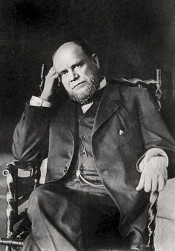
Литературное наследие выдающегося юриLiterary heritage of the prominent lawyer Anatoly Koni presented in the Presidential Library’s collections ста А. Ф. Кони представлено в фонде Президентской библиотеки
February 9, 2020 marks the 176th anniversary of the birth of an outstanding Russian lawyer, statesman and public figure, writer Anatoly Koni. The electronic collections of the Presidential Library feature materials about the life and professional activities of one of the prominent representatives of the Russian intelligentsia of the late XIX - early XX centuries, as well as with his brilliant literary works.
In addition, the heroes of Koni’s literary works were really such outstanding representatives of their time as Sergei Witte, Anton Chekhov, Fyodor Dostoevsky, Nikolai Nekrasov, Leo Tolstoy, Alexander Ostrovsky and many others.
Anatoly Koni, in his book “Memoirs of Anton Chekhov”, released in 1925 and stored in the Presidential Library, notes: “In my memory, his image stands as if alive - with a sad, thoughtful, precisely directed inside a look, with an attentive and gentle attitude to the interlocutor, and with an outwardly calm word, behind which one can feel the beating of a heart that is hot and responsive to human sorrows”. As a lawyer and as a person working in the penitentiary system, he especially appreciated Chekhov for his book “Sakhalin Island”, which raises the problems of the difficult conditions of the exiled convicts.
Koni and Chekhov were in constant correspondence. Anatoly Fedorovich visited the writer in Yalta, and later wrote about these meetings: “The house belonging to him, built on one of the outskirts, had some kind of unpleasant appearance, and notes on the walls of the front and office with a request“ not to smoke ”indicated that the owner something is amiss. Indeed, Anton Pavlovich’s buttoned-up coat, his pensive at times look and expressive silence or a question from another area in response to a desire to find out about his health showed that he feels his vitality gradually leave him”. Most likely, they had long frank conversations, as the following lines say: "Chekhov was very interested in my personal memories and psychological observations from the field of witness testimony".
Koni does not mention whether Chekhov used these materials in his works, but it is known for sure that the rich life experience of the famous lawyer served as the basis for one of the novels of another great Russian writer Leo Tolstoy. the publication “Anatoly Fedorovich Koni. 1844–1924” provides a detailed account of the collaboration of these two prominent personalities: “The name of Koni with the name of Tolstoy, in addition to many other things, is most definitely and firmly associated thanks to the novel “Resurrection” - a work that is in diaries ”L. N. usually called letters “Konevskaya novel” because he always remembered that his theme, his main idea was given to him precisely by Anatoly Fedorovich”.
According to the memoirs of a lawyer on the pages of the 1921 edition “Nekrasov. Dostoevsky” it is possible to recreate the appearance of the great Russian poet Nikolai Nekrasov: “For the first time I had to see him at the end of the fifties on Nevsky Prospect, when I met my father. I eagerly peered into his yellowish face and tired eyes and listened to his deaf voice: at that time his name already told me a lot”.
The story of the old peasant, transmitted to Koni by a famous writer, also served as a source of literary inspiration to Nekrasov: “When we parted, he told me: “I will take advantage of this”, - and a year later he sent me a proof sheet on which it was written: “About Jacob the Faithful - serf approximate, "asking to say, "is that so?". I answered him that some small options did not change the essence of the matter at all, and a month later I received from him a separate print of that part of "Who is Happy in Russia?", which depicts this prone story in amazing verses".
He dedicated the book “Petersburg: Memoirs of an Old-Timer” to his native city of St. Petersburg, which became for Koni a literary hero. The electronic copy of the 1922 edition says: “Not only Petersburg of these days is deserted, lifeless and “sprinkled”, but also that huge and densely populated, luxuriously built-up city full of trade and street traffic, as it was before the ill-fated war until 1915, in many ways differs from Petersburg from the early 50s to the mid 60s. <...> The old city of St. Peter sometimes arises in the memory of old-timers in their former original form, and I want, “sorting through the beads of memories”, to go through it with a visitor and introduce him to these memories that have gone into the area of an irrevocable past”.
The Presidential Library’s collections also contain the works of Koni regarding his activities in the legal field: The Court - Science - Art: (from the memoirs of a judicial figure), 1923, On the jury and on the court with estate representatives of 1895 , Fathers and Sons of Judicial Reform 1914, and many others.

